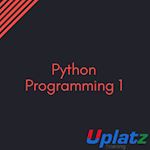Python Programming Instructor-led Training
Free server access, Class recordings, Certification guidance, Job & Interview assistance, Course Completion Certificate
Uplatz
Summary
- Uplatz Certificate of Completion - Free
- Tutor is available to students
Add to basket or enquire
Overview
Uplatz offers this comprehensive training on Python Programming. The course will be conducted in the form of live instructor-led training classes.
Python is an object oriented rapid development language deployed in many scenarios in the modern world.
Python is a popular object-oriented programming language that is simple to learn and use. It can operate on a variety of operating systems, including Windows, Linux, and Mac, making it a popular choice in the Data Analytics field.
This Python Programming training is designed to give delegates the knowledge to develop and maintain Python scripts using the current version of Python.
Learn to write Python and work with packages like SciPy, Matplotlib, Pandas, Scikit-Learn, NumPy, web scraping libraries, and the Lambda function with the most in-demand Advanced Python Programming online tutor-led training certification course. You will learn how to build Python code for Big Data platforms such as Hadoop and Spark in this online Python training. Work on real-world projects to earn your Python certification and acquire practical experience. This Python certification course will teach you how to use the decade's most popular high-level, general-purpose dynamic programming language. You will be introduced to both fundamental and advanced Python concepts such as Machine Learning, Deep Learning, Hadoop streaming, and MapReduce, as well as working with packages like as Scikit and SciPy, in this Python course.
This Python Programming training comprises sessions dealing with syntax, variables and data types, operators and expressions, conditions and loops, functions, objects, collections, modules and packages, strings, pattern matching, dates, exception handling, files, and databases.
Exercises and examples are used throughout the course to give practical hands-on experience with the techniques covered.
Course Objectives
- The importance of Python and its installation
- OOP, expressions, data types, looping, and other topics.
- Machine Learning algorithms in Python: functions, operations, and classes
- Data Visualization in Python
- Skills to pass Python professional certification
Certificates
Uplatz Certificate of Completion
Digital certificate - Included
Course Completion Certificate by Uplatz
Course media
Description
Python Programming - Course Syllabus
Course Introduction
- Administration and Course Materials
- Course Structure and Agenda
- Delegate and Trainer Introductions
Session 1: GETTING STARTED
- About Python
- Python versions
- Python documentation
- Python runtimes
- Installing Python
- The REPL shell
- Python editors
Session 2: PYTHON SCRIPTS & SYNTAX
- Script naming
- Comments
- Docstring
- Statements
- The backslash
- Code blocks
- Whitespace
- Console IO (to enable the writing of simple programs)
- A first Python program
- Script execution
Session 3: VARIABLES & DATA TYPES
- Literals
- Identifiers
- Assignment
- Numbers (bool, int, float, complex)
- Binary, octal, and hexadecimal numbers
- Collections (str, list, tuple, set, dict)
- None
- Implicit and explicit type conversion (casting)
- The type function
Session 4: OPERATORS & EXPRESSIONS
- Arithmetic Operators
- Assignment Operators
- Comparison Operators
- Logical Operators
- Membership Operators
- Bitwise Operators
- Identity Operators
Session 5: CONDITIONS & LOOPS
- Conditional statements (if, elif, else)
- Short hand if/if else
- Python's alternative to the ternary operator
- Iterative statements (while, for, else)
- The range function
- Iterating over a list
- Break
- Continue
- Nested conditional/iterative statements
Session 6: FUNCTIONS
- Declaration
- Invocation
- Default values for parameters
- Named arguments
- args and kwargs
- Returning multiple values
- Nested functions
- Functions as data
- Introduction to lambda expressions
- Variable scope
- The pass keyword
Session 7: OBJECTS AND CLASSES
- About objects
- Attributes and the dot notation
- The dir function
- Dunder attributes
- Mutability
- The id function
- Pass by reference
- Introduction to Classes
- Class Declaration and Instantiation
- Data attributes
- Methods
- Composition
Session 8: LISTS
- About lists
- List syntax including slicing
- Getting and setting list elements
- Iterating over a list
- Checking for the presence of a value
- The len function
- List methods incl. append, insert, remove, pop, clear, copy, sort, reverse etc.
- The del keyword
- Appending to and combining lists
- List comprehension
Session 9: TUPLES
- About tuples
- Tuple syntax
- Getting tuple elements including unpacking
- Iterating over a tuple
- Checking for the presence of a value
- The len function
- Appending to and combining tuples
Session 10: SETS
- About Sets
- Dictionary syntax
- Creating, adding and removing set elements
- Iterating over a set
- Membership Testing
- Sorting
- Copying
- Set methods incl. union, intersection, difference, symmetric_difference etc.
Who is this course for?
Everyone
Requirements
Passion and determination to achieve your goals!
Questions and answers
Currently there are no Q&As for this course. Be the first to ask a question.
Reviews
Currently there are no reviews for this course. Be the first to leave a review.
Legal information
This course is advertised on reed.co.uk by the Course Provider, whose terms and conditions apply. Purchases are made directly from the Course Provider, and as such, content and materials are supplied by the Course Provider directly. Reed is acting as agent and not reseller in relation to this course. Reed's only responsibility is to facilitate your payment for the course. It is your responsibility to review and agree to the Course Provider's terms and conditions and satisfy yourself as to the suitability of the course you intend to purchase. Reed will not have any responsibility for the content of the course and/or associated materials.


